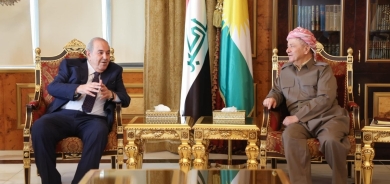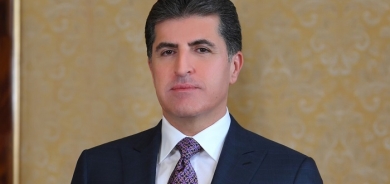Dr. Anna Geifman: The establishment of Kurdistan is a political issue that must be resolved, notwithstanding the Islamic State threat
July 8, 2015
Exclusive Interviews

Gulan: lack of freedom and democracy are seen as the main reasons for backwardness and underdevelopment of the Middle East. Yet, with the Arab Spring revolutions and emergence of freedom, people of this area warmly received the idea of Islamic extremism and Islamic State of ISIS has violated the region the way it is impossible to return the area to the time before ISIS. In your opinion, what is the main reason of the chaos in the Middle East?Gulan: lack of freedom and democracy are seen as the main reasons for backwardness and underdevelopment of the Middle East. Yet, with the Arab Spring revolutions and emergence of freedom, people of this area warmly received the idea of Islamic extremism and Islamic State of ISIS has violated the region the way it is impossible to return the area to the time before ISIS. In your opinion, what is the main reason of the chaos in the Middle East?
Anna Geifman: Revolutions should not be equated with the “emergence of freedom”. More often—especially in the initial phases—they are associated with chaos and violence. Freedom and democracy may be popular revolutionary slogans, but it does not mean that radical leaders who employ them are in fact driven by a burning desire to provide their people with basic human rights. The primary goal is to break away from and destroy the old order, the hated past. To do so, the revolutionary leaders are prepared to subject millions to a great deal of political and social instability, even anarchy, and the ensuing brutality. The first to suffer are precisely those whom the leaders claim to be “liberating”.
To what extent people “warmly received the idea of Islamic extremism” is impossible to assess. The extremists claim that people support them, but the truth is that we simply have no idea what millions of Muslims really think. Having tested the “freedom”, they may hope to go back to the good-old dictatorial status quo, with assured order. The Egyptians who brought down the military rule of Hosni Mubarak in 2011 in the following year elected the Muslim Brotherhood’s Muhammad Morsi, only to restore the military regime in 2013. And in the emergent Islamic State no one would dare to true political sentiments. In any case, it does not matter what the people want when, under oppressive regimes, “the fanatics own them,” according to a famous statement by Dr. Emanuel Tanay: the zealots bomb, behead, murder, and honor-kill, and the majority under their control is cowed and irrelevant.
The on-going turmoil in the Middle East confirms this general state of affairs. The detrimental US policy in the region certainly contributed to the disintegration of the traditional political regimes. However, the Arab Spring revolutions did not begin in the war-ravaged post-Saddam Hussein Iraq. Nor does the US’ half-hearted engagement in Syria explain the sensational conquests of the Islamic State during its single year of existence. It is far more important that SIS exploits the gaping power vacuum, resulting from tribal, religious, and ethnic discord in various Arab states.
The chaos and violence in the Middle East follow the pattern of many other revolutionary processes, which we have witnessed around the globe in the past century. Simply, it is now the Arabs’ turn. But we would be wise not to neglect our bitter experience with ideology-based, fundamentalist extremism. By looking at the past, we can understand much of what is blurred in the present.
Gulan: Due to the insisting of the West in general and U.S. in particular, over the map of Middle East, the problems are getting further complicated day after day, and ISIS is getting stronger and larger. The question is if the international coalition against terrorism deals with ISIS this way, what will happen to the future of the Middle East?
Anna Geifman: There were several times in the last hundred years, when terrorists in power sought to build states. In this sense, ISIS is not doing anything new: extremists have repeatedly strove to come to power and to project their past underground terrorist experience into the region under their control. Using the captured territory as a base, they exerted ceaseless effort to expand it, in accordance with their ideology—be it Communist, Nazi, or Jihadist—but invariably messianic, universalist, and globalist, aiming to conquer the world. It is important to be clear on this point: like other fundamentalists striving to power, ISIS seeks to build a totalitarian political establishment, in which the state controls its citizens and exploits them for its purposes. That is, citizens, whom the ruling ideology has not sentenced to be wiped out entirely as “enemies of the people,” “racial enemies”, or religious “heretics”. Large areas of Iraq and Syria that are being incorporated into the Caliphate will be a geographic base for the new Middle Eastern totalitarian state.
Gulan: In the first anniversary of founding Islamic Caliphate of ISIS, they performed some dangerous terroristic attacks in Tunisia, France, Kuwait and Somalia. In your opinion, what is the message ISIS delivering to Middle Eastern societies and Western countries?
Anna Geifman: France has been one of jihadists’ preferred targets in Europe; Tunisia was punished for enjoying good economic ties with the “infidels”; and the Shia mosque assault in the Kuwait City was part of the ISIS all-out war against the main religious rival. Yet, obviously there was a common message communicated via the June 26 coordinated attacks, for which ISIS took responsibility. The message was two-fold: “we seek global domination, and we have the power to strike everywhere around the globe”.
Like the Communists, whose goal was “world revolution”, and like the Nazis, who have sought “a thousand-year old Reich”, the Islamic States strives to become a world-wide Caliphate and asserts this objective in a variety of ways. According to The Telegraph (June 29, 2015), ISIS declared that it would start minting its own currency to “emancipate itself from the satanic global economic system”. One side of the new golden coin featured a world map—the envisaged area of the “Islamic dinar” circulation.
Gulan: Last week, a number of ISIS terrorists sneaked into Kobani and performed a bloody massacre in which they killed 200 civilians and innocent people. There are views blaming Turkey for assisting ISIL. In your opinion, if there are countries helping ISIL, what will happen to the Anti-Islamic State front?
Anna Geifman: Your question contains two parts. That 200 innocent civilians were killed is a confirmation that we are dealing with people with totalitarian mentality. What this means is that certain categories of people are declared to be “the enemy”—based on their socio-economic status or class, their race, or their religious identity. The totalitarians persecute their “enemies” not because they have done something against the ruling regime, but because of who they are, because they belong to a group designated for destruction. Indeed, the totalitarian way of thinking allows only two possibilities for the human being: he finds himself among those to be collectively eliminated; alternatively, he is forced to contribute to the totalitarian establishment. In other words, he serves as a tool in carrying out the state’s overriding principles of class, ethnic, or religious terrorization and “cleansing”. The 200 civilians massacred in Kobani exemplify the first category. People who are allowed to live in the Islamic State must belong to the second one.
Now, if Turkey were indeed to blame for helping ISIS, not much, in my opinion, would happen to the anti-ISIS coalition front. The current Turkish administration would have no interest in openly embracing extremists in Syria, even if there would be occasional small-scale “deals” between them. More worrisome is that those who claim to be fighting the Islamic State are far from being engaged in a full-hearted effort to stop the Middle Eastern scourge.
Gulan: Regarding Iraq, currently 30% of Iraqi land, which is composed of Mosul and Anbar provinces, has been occupied by ISIS and has been established a state on it. This has isolated Kurdistan region from Baghdad, and it means that the central government in Baghdad has practically become a Shiite government. To what extent has this division of Iraq become a de-facto, even if ISIS is defeated?
Anna Geifman: It does not look like ISIS will be defeated in a very near future; so, for now, we have to regard the division of Iraq as a fait accompli. According to an informed source, Iraqis have been doing so poorly against ISIS because of their inferior ability to understand the very notion of defending “their state”. To many of them the concept of statehood is not at all meaningful, nor worthy of a fight. However, if ISIS sought to conquer the country’s Shiite regions, the locals would likely be up-in-arms and show much greater resistance, protecting their tribal and religious interests.
Gulan: Kurdish question in the Middle East and the establishment of independent Kurdistan has become a warm topic of the global Media and research centers in the West. But politically this issue is not supported. To what extent will the establishment of Kurdistan state become a factor for defeating ISIS terrorists?
Anna Giefman: The Kurdish people must be congratulated for their steadfast effort against ISIS. They have been more successful than any other local force. The establishment of Kurdistan is a political issue that must be resolved, notwithstanding the Islamic State threat. Still, via their relentless fighting, the Kurds have proven that, if granted their long-awaited goal, the state of Kurdistan would remain a dependable member of the coalition against ISIS.
Gulan: Experts are mostly pessimistic about destroying ISIS in terms of mind because the source of the mind, which is the Jihadist-Salafism, is self-grown in the area. So, even if ISIS is defeated, then a group wilder than ISIS will emerge. What is the suitable path for eradicating the idea of ISIS?
Anna Geifman: Again, ISIS is the newest form of totalitarianism, that bane of the entire previous century. The first victims of any totalitarian state are its own citizens: before the extremists venture to spread their ideology to others, they terrorize and enslave their own. Under the totalitarian control people experience a humanitarian catastrophe, and those who come to relieve their suffering will be welcomed. I doubt we should lose sleep over some future “group wilder than ISIS”, at least not until the problem arises. In the meantime, however, ISIS is building its state infrastructure, making it increasingly difficult for foreign forces to dismantle the hub of spreading Islamist totalitarism. It would have been relatively easy to get rid of the Communist government of Russia in 1918, thus preventing terrorization and countless victims of the Soviet aggression worldwide. It would have been a simpler task to force the Nazis out of power in the mid-1930s than in 1945, avoiding the slaughters of WWII. ISIS is a nascent totalitarian state, akin to the Communist and the Nazi ones. It should be dealt with accordingly.
All fundamentalist ideologies have been extremely attractive in the countries of their origin and in foreign cultures around the globe—but only so long as the totalitarian regimes remained strong. The “fatal attraction” miraculously faded once they collapsed. Similarly, the ISIS’ gruesome frolics and doctrines are attractive in the Middle East and elsewhere only as a reflection of a budding state power. When the state is no more, the ideology will reveal itself as an empty slogan and a frustrated cry for destruction.















